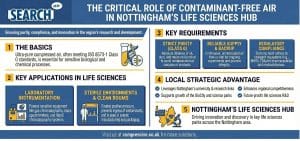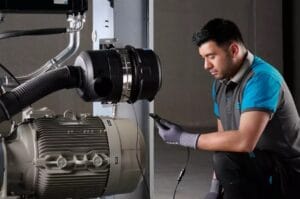The Critical Role of Contaminant-Free Air in Nottingham’s Life Sciences Hub
Nottingham is one of the fastest-growing life sciences clusters in the UK.
It boasts several incubators, including BioCity, MediCity, and the University of Nottingham’s Biodiscovery Institute.
Here, in hi-tech facilities, compressed air is a vital but potentially dangerous utility. Trace contamination of compressed air can compromise research or entire production batches. For this reason, compressed air quality control must be closely monitored.
Air is drawn from the atmosphere. So the compression process increases the concentration of moisture, oil, particulates, and microorganisms. Untreated, this compressed air can spoil otherwise sterile environments. Therefore, compressed air quality management is not an option for world-class life sciences institutions in Nottingham.
Compressed Air Contaminants in Life Sciences Facilities
Compression causes a significant increase in the concentration of airborne contaminants, which present a range of particular and potentially serious hazards to life sciences applications.
Water
Water vapour is always present in atmospheric air and condenses to liquid as a result of compression. It can also lead to microbial growth and biofilm formation: a protected colony of microorganisms that can dislodge and contaminate the air stream.
Oil
Oil can enter a compressed air system through lubricated compressors. It may also be present in the atmosphere as hydrocarbon vapour. Even the smallest trace can cause problems. A pharmaceutical batch might be spoiled. Analytical data can show deviations. Cell culture growth may be disrupted. In each case, equipment must be shut down for cleaning.
Solid Particles
This category includes dust, rust, and microscopic wear particles. In a sterile environment, these particles can spoil products, block fine nozzles used in tablet coating, and cause abrasive damage to sensitive equipment.
Microorganisms
Bacteria, yeasts, and mould spores drawn into the compressor represent a significant financial risk. A single contaminating microbe introduced into a fermentation process or cell culture can result in the complete loss of a product batch.

Contaminant free compressed air is essential to protect research quality safety and compliance in life sciences facilities
Atlas Copco Oil-Free Compressors and Air Treatment Solutions
In the life sciences, risk assessment and management are taken very seriously because the consequences of failure are potentially very high. Operators in this industry have no choice but to adhere to standards such as ISO 8573-1 and Good Manufacturing Practice (GMP). The most appropriate grade for the most critical life sciences applications is ISO 8573-1:2010 Class 0 for total oil, as it eliminates all risk of oil contamination from the compressor.
To achieve this, an engineered solution is required that is holistic in design and progresses from risk management to risk elimination. A complete treatment system from Search Air (William G. Search Ltd.) includes:
- Certified Class 0 Oil-Free Compressors: The only responsible choice for life sciences is a certified oil-free compressor. Atlas Copco’s Z-series oil-free air compressors are engineered to introduce zero oil into the compression chamber. Atlas Copco’s VSD+ models can also reduce energy consumption by up to 35%, while integrated heat recovery systems support sustainability goals.
- Advanced Air Drying and Filtration: A complete purification train is essential. This includes air drying and filtration solutions, such as desiccant dryers, to achieve pressure dew points as low as -70°C, which inhibit microbial growth. This is followed by particulate, coalescing, and activated carbon filters.
- Intelligent Monitoring: Advanced systems utilise intelligent monitoring to ensure continuous compliance. Atlas Copco’s SMARTLINK technology delivers real-time data and predictive maintenance alerts, as well as AIRScan energy audits that pinpoint system inefficiencies.
The demands for purity in the life sciences are similar to those for air compressors in the food and beverage industry. Unlike many competitors who rely on third-party filtration, Atlas Copco provides a fully integrated, Class 0-certified ecosystem—compressors, dryers, and monitoring—to ensure compliance.

The Critical Role of Contaminant-Free Air in Nottingham’s Life Sciences Hub
Beyond Compliance: A Partnership for Purity and Efficiency
Generating pure air is only the first step. The distribution network must be constructed from non-corrosive materials, and GMP requires routine monitoring to ensure the system performs as specified.
A system that passes validation can become a contamination risk without expert maintenance. As a premier Atlas Copco distributor, Search Air provides the expert air compressor services that the local life sciences hub demands in Nottingham. We support our clients’ compliance needs with services that include air quality and breathing air testing to verify ISO 8573-1 standards, as well as the provision of Written Schemes of Examination (WSEs) to meet legal obligations.
To ensure your compressed air system meets life sciences standards, speak with our Nottingham team for an airCHECK audit or consultation.

